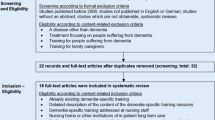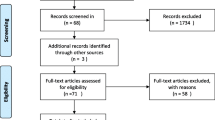Abstract
Background
Dementia is one of the most prevalent diseases in the older population. Various dementia care models have been developed to address patient’s healthcare needs. They can be described as “collaborative care” or “person-centered care”. Referring to the needs of the workforce working with persons with dementia, a key element is the use of interprofessional education (IPE).
Objective
The purpose of this article is to describe different international collaborative care models to define a minimum standard of healthcare professions for collaborative dementia care in primary care. This helps to identify requirements for IPE to optimize care of people with dementia and to support informal caregivers in the future.
Material and methods
In this article six dementia care models from 4 different countries (Germany, USA, UK and Netherlands) are described and compared regarding aims, interventions and healthcare professionals involved.
Results
Care teams are minimally comprised of general practitioners or primary care providers, nurses, and social workers. Additional healthcare disciplines may be involved for specific interventions. Mostly, care team members received specific training but such training did not necessarily incorporate the IPE approach. To ensure successful collaboration of professions, IPE training programs should at least consist of the following core topics: (1) early diagnosis, (2) postdiagnostic support, (3) advanced care planning for patients and caregivers and (4) effective collaborative care.
Conclusion
The IPE programs for dementia should be expanded and must be widely implemented in order to assess the impact on collaborative practice. This study will provide the knowledge base for structuring IPE trainings developing educational agendas and adapting existing guidelines to improve collaborative dementia care in the future.
Zusammenfassung
Hintergrund
Demenz ist eine der häufigsten Erkrankungen im höheren Alter und erfordert innovative Konzepte zur Versorgung der Betroffenen. Um Gesundheitsberufe adäquat auf eine patientenzentrierte, interprofessionelle Demenzversorgung vorzubereiten hat sich das interprofessionelle Lernen (IPL) bewährt.
Ziel der Arbeit
Ziel ist es, Versorgungskonzepte für Menschen mit Demenz zu beschreiben und einen Mindeststandard an Professionen zu definieren, die an der patientenzentrierten Demenzversorgung beteiligt werden sollten, sowie Erfordernisse an das IPL zu identifizieren.
Material und Methoden
Sechs Versorgungskonzepte aus 4 Ländern (Deutschland, USA, Großbritannien, Niederlande) werden hinsichtlich ihrer Ziele, Interventionen und involvierten Gesundheitsfachberufe verglichen, um Rückschlüsse für das IPL zu ziehen.
Ergebnisse
Hausärzte, Pflegefachpersonen und Sozialarbeiter sind in allen Ländern Teil des Versorgungsteams. Weitere Gesundheitsberufe werden für spezifische Interventionen einbezogen. Die Mitglieder des Versorgungsteams werden zumeist speziell qualifiziert, jedoch nicht im interprofessionellen Lernansatz. IPL Qualifikationen sollten mindestens folgende Themenbereiche umfassen: (1) frühe Diagnostik, (2) Versorgung nach Diagnosestellung, (3) effektives Versorgungsmanagement und (4) interprofessionelle Zusammenarbeit.
Diskussion
IPL sollte künftig für das Krankheitsbild Demenz ausgeweitet sowie weitreichend implementiert und evaluiert werden, um den Nutzen für die interprofessionelle Teamarbeit in der Praxis zu überprüfen. Dies ist die Basis, um länderspezifische IPL Bildungsprogramme zu entwickeln und bestehende Versorgungsleitlinien für eine verbesserte interprofessionelle Demenzversorgung im ambulanten Setting anzupassen.



Similar content being viewed by others
References
Alzheimer’s Disease International (2015) World Alzheimer Report 2015. The Global Impact of Dementia. An analysis of prevalence, incidence, cost and trends https://www.alz.co.uk/research/WorldAlzheimerReport2015.pdf. Accessed 23.03.2017
Austrom MG et al (2015) Workforce development to provide person-centered care. Aging Ment Health 20(8):781–792. doi:10.1080/13607863.2015.1119802
Galvin JE, Valois L, Zweig Y (2014) Collaborative transdisciplinary team approach for dementia care. Neurodegener Dis Manag 4(6):455–469
Reilly S et al (2015) Case management approaches to home support for people with dementia. Cochrane Database Syst Rev:. doi:10.1002/14651858.cd008345.pub2
Prince M et al (2016) World Alzheimer Report 2016 – Improving healthcare for people living with dementia: coverage, quality and costs now and in the future, p 140
Stephan A et al (2015) Successful collaboration in dementia care from the perspectives of healthcare professionals and informal carers in Germany: results from a focus group study. BMC Health Serv Res 15:208
Cartwright J et al (2015) Promoting collaborative dementia care via online interprofessional education. Australas J Ageing 34(2):88–94
Thyrian JR et al (2012) Life- and person-centred help in Mecklenburg-Western Pomerania, Germany (DelpHi): study protocol for a randomised controlled trial. Trials 13:56
Calabrese P, Kessler J (2000) Screening for cognitive impairment in dementia – the DemTect procedure. European Neuropsychopharmacology 10:369
Thyrian JR et al (2016) Relatives’ burden of caring for people screened positive for dementia in primary care : results of the Delphi study. Z Gerontol Geriatr 50:4. doi:10.1007/s00391-016-1119-9
Eichler T et al (2014) Dementia care management: going new ways in ambulant dementia care within a GP-based randomized controlled intervention trial. Int Psychogeriatr 26(2):247–256
LaMantia MA et al (2015) The aging brain care medical home: preliminary data. J Am Geriatr Soc 63(6):1209–1213
Dreier A et al (2016) Qualifications for nurses for the care of patients with dementia and support to their caregivers: a pilot evaluation of the dementia care management curriculum. Nurse Educ Today 36:310–317
Callahan CM et al (2011) Implementing dementia care models in primary care settings: the aging brain care medical home. Aging Ment Health 15(1):5–12
Iliffe S et al (2015) Changing practice in dementia care in the community: developing and testing evidence-based interventions, from timely diagnosis to end of life (EVIDEM). NIHR Journals Library, Southampton, p 636
Wilcock J et al (2016) Diagnosis and management of dementia in family practice. Aging Ment Health 20(4):362–369
Wilcock J et al (2013) Tailored educational intervention for primary care to improve the management of dementia: the EVIDEM-ED cluster randomized controlled trial. Trials 14:397
Iliffe S et al (2014) The effectiveness of collaborative care for people with memory problems in primary care: results of the CAREDEM case management modelling and feasibility study. Health Technol Assess 18(52):1–148
Bamford C et al (2014) Understanding the challenges to implementing case management for people with dementia in primary care in England: a qualitative study using Normalization Process Theory. BMC Health Serv Res 14:549
Radboud university medical centre (Radboudumc) (2016) R.I.f.H.S. DementieNet. http://www.dementienet.com/. Accessed 23.08.2016
Wubbeler M et al (2016) How do people with dementia utilise primary care physicians and specialists within dementia networks? Results of the Dementia Networks in Germany (DemNet-D) study. Health Soc Care Community 25:285. doi:10.1111/hsc.12315
Wübbeler M et al (2015) Outpatient care of people with dementia within residential communities in Germany - care potential and cost. Gesundheitswesen 77(11):839–844
Reeves S et al (2008) Interprofessional education: effects on professional practice and health care outcomes. Cochrane Database Syst Rev:. doi:10.1002/14651858.cd002213.pub2
Zorek J, Raehl C (2013) Interprofessional education accreditation standards in the USA: a comparative analysis. J Interprof Care 27(2):123–130
World Health Organization (2010) Framework for action on interprofessional education & collaborative practice, p 64
Iliffe S et al (2010) Evidence-based interventions in dementia: a pragmatic cluster-randomised trial of an educational intervention to promote earlier recognition and response to dementia in primary care (EVIDEM-ED). Trials 11:13
Chalk A, Page S (2016) Dementia RED (Respect Empathy Dignity): Collaborating to build dementia supportive communities in North Wales–reporting on a pilot project (innovative practice). Dementia (London) 15(2):257–262
Pelone F et al (2015) Interprofessional education in the care of people diagnosed with dementia: protocol for a systematic review. BMJ Open 5(4):e007490
Downs M et al (2006) Effectiveness of educational interventions in improving detection and management of dementia in primary care: cluster randomised controlled study. BMJ 332(7543):692–696
Brody AA, Galvin JE (2013) A review of interprofessional dissemination and education interventions for recognizing and managing dementia. Gerontol Geriatr Educ 34(3):225–256
Turner S et al (2004) General practitioners’ knowledge, confidence and attitudes in the diagnosis and management of dementia. Age Ageing 33(5):461–467
Acknowledgements
The DelpHi trial was developed and established as a result of input from the following experts in their respective fields: Aniela Angelow, Grit Aßmann, Georgia Böwing, Thomas Fiß, Daniel Fredrich, Leonore Köhler, and Steffen Richter. An experienced field study team provided support with data collection and data management: Ines Abraham, Kerstin Albuerne, Vaska Böhmann, Kathleen Dittmer, Sarah Gardzella, Jana Hubert, Ulrike Kempe, Viktoriya Kim, Julius Krause, Andrea Pooch, Saskia Moll, Sabine Schmidt, and Christine Winckler. The authors thank all participating patients and their general practitioners for their most valued collaboration. The study is funded by the German Center for Neurodegenerative Diseases (DZNE) and the University Medicine Greifswald. Dr. Guerriero Austrom was supported in part by NIA Grant No. P30AG10133.
Author information
Authors and Affiliations
Corresponding author
Ethics declarations
Conflict of interests
A. Dreier-Wolfgramm, B. Michalowsky, M.G. Austrom, M.A. van der Marck, S. Iliffe, C. Alder, H.C. Vollmar, J.R. Thyrian, D. Wucherer, I. Zwingmann and W. Hoffmann declare that they have no competing interests.
All procedures of the six described studies were in accordance with the ethical standards of the responsible ethics committee on human experimentation (institutional and national) and with the Helsinki Declaration of 1975 (in its most recently amended version). Informed consent was obtained from all individual participants included in the study.
The supplement containing this article is not sponsored by industry.
Rights and permissions
About this article
Cite this article
Dreier-Wolfgramm, A., Michalowsky, B., Austrom, M.G. et al. Dementia care management in primary care. Z Gerontol Geriat 50 (Suppl 2), 68–77 (2017). https://doi.org/10.1007/s00391-017-1220-8
Received:
Revised:
Accepted:
Published:
Issue Date:
DOI: https://doi.org/10.1007/s00391-017-1220-8




